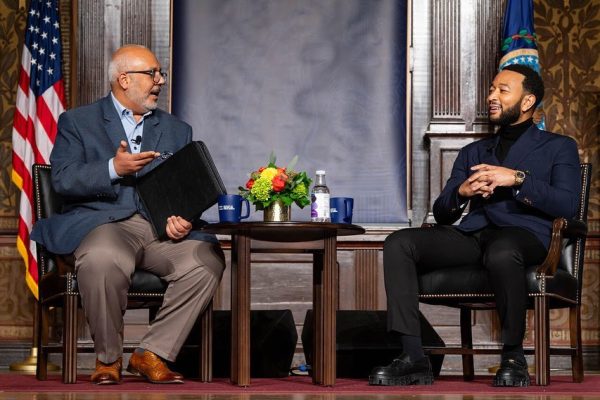John Legend emphasized using his platform as an artist and activist to advocate for social justice at a Georgetown University event Oct. 15.
The Georgetown University Institute of Politics and Public Service (GU Politics) hosted the conversation as part of a speaker series called “Know Your Power.” Mo Elleithee (SFS ’94), the executive director of GU Politics, moderated the conversation with Legend, the critically acclaimed EGOT winner and multi-platinum musician, who addressed the importance of local politics, combining art with activism and ending mass incarceration.
Legend recounted his early aspirations, citing an essay he wrote at 15 about Black history. He said his long-standing vision of using his influence and resources for a greater cause shaped his early career.
“I envision a successful musical career that would allow me to obtain high visibility,” Legend said at the event, reading from his essay. “This, in turn, will put me in a position of great influence, which I will utilize and advocate for the advancement of Blacks in America.”
Legend said artists such as Harry Belafonte and Nina Simone inspired him because they used their platforms as musicians to inspire social change.
“All of these artists that I looked up to believed that it was about more than just making music, that part of their role was to, in their art, reflect what was going on in the world,” Legend said.

Beyond music, Legend’s advocacy efforts have focused on the criminal justice system. He has founded organizations like FREEAMERICA, which works to end mass incarceration, and HUMANLEVEL, which promotes equity in local government, and endorsed candidates in local prosecutor races as a means of promoting local reform.
Legend said his activism for criminal justice reform is inspired by meeting people affected by mass incarceration and inequity, citing his personal experience visiting jails in New Orleans, La., as an illustration of the link between the United States’ history of slavery and mass incarceration.
“There’s a new museum that they dedicated to showing the direct connection between slavery and the current jail and prison system in Louisiana, and I saw how stark that connection was,” Legend said. “I was able to look into the eyes of people who were affected by this every single day. If I needed any extra motivation, that’s my motivation.”
Legend said local politics play a particularly important role in making change in the realm of mass incarceration.
“Sometimes all of us forget how important our local officials are in determining our futures and the conditions that we live in in some way,” Legend said. “So many of the people who are locked up currently were done so under state law and by officials who work locally and in the state.”
Local officials can be a crucial source of policy change because they are most closely tied to smaller communities, Legend added.
“Local government has so much power in making sure that the voices of marginalized people were actually being centered and listened to, and that policy and implementation thereof was always considering their needs,” Legend said.
Legend urged students to approach their own activism with optimism and personal involvement in social justice.
“Hope should be your strategy to motivate you to do the work,” Legend said. “I think you have to have that combination of that sense of urgency, of seeing the power up close, humanizing the problem and then letting that fuel your passion.”
Matilde Coelho da Silva (GRD ’26) said Legend’s ability to communicate the importance of activism impressed and surprised her.
“I was positively surprised to hear him speak,” Coelho da Silva told The Hoya. “He is able to communicate with the youth in terms of all the ways that they can contribute in their communities first and only then can they make a change.”
Maea Applegarth (University of Sydney), an exchange student, said he enjoyed listening to Legend speak passionately about his activism.
“I think the passion and outward intensity with which he spoke was very interesting,” Applegarth told The Hoya. “I enjoyed listening to his opinions and ability to drive people to strive for their own goals and push for the change they want to see in the community.”
Legend said his care for social justice comes from a place of genuine care and positivity.
“I feel like when I speak out, I’m speaking from a place of love and empathy and care for humanity,” Legend said.